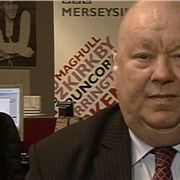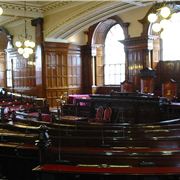MAYOR Anderson is in the firing line, yet again, this time with the launch of a petition which, if it succeeds, would see him forced out of his job.
The battle cry comes down to this: the people of Liverpool were denied the chance to decide in the first place whether we wanted to be ruled by a mayor.
There will always be a suspicion that if somebody challenges the Mayor, the red card will be shown
The reality is the city council went straight for a mayoral vote and it was won by the then leader of the council, Joe Anderson. The turnout wasn’t that resounding, just about a fifth of the voters took part in the poll. But Anderson was the runaway winner, collecting far more votes than all the other contenders put together.
Should the petition, launched by Anderson's one-time golden boy, Jake Morrison, succeed, the city would return to a leader and cabinet model of governance, and essentially nothing would change.
 Joe AndersonMayor Anderson, in the cruellest and most difficult circumstances imposed by the Coalition Government is, in the main, doing a good job. He has a cabinet made up, by and large, of able and caring people.
Joe AndersonMayor Anderson, in the cruellest and most difficult circumstances imposed by the Coalition Government is, in the main, doing a good job. He has a cabinet made up, by and large, of able and caring people.
There are certain things about the Mayor’s style I would counsel against, and for the price of a cup of tea rather than the hefty fee a greedy consultant spin doctor would charge, I’d share those privately with him.
Having covered civic affairs for longer than any of the councillors have served at the Town Hall, there is one conclusion I have come to. Governance by the major parties, with councillors elected by the citizens, is as good as it could ever get, or ever will be.
Do we really want a city governed by single-issue independents, fighting their own little corners, neighbourhood tin-pot Hitlers with their axes to grind?
Such people are often blinkered and focus only on the matters that concern them, whether it is parking problems, dog muck or plans for an unwanted hostel on their doorsteps.
I’ve noticed a big change in Joe Anderson since his election as Liverpool’s first directly elected mayor. His power, as such, has hardly changed compared to that he held as leader. But the title of Mayor elevated the job to a new level on the world stage. And that can only be good for a port city eager to reach out to every continent.
 Toothless: The council chamberUntil the dying days of the 20th century Liverpool, like every other city, was governed by councillors. We had 99 of them and virtually every decision was made at council meetings. Fifty votes were needed for anything to happen.
Toothless: The council chamberUntil the dying days of the 20th century Liverpool, like every other city, was governed by councillors. We had 99 of them and virtually every decision was made at council meetings. Fifty votes were needed for anything to happen.
Then Tony Blair - saying he wanted to streamline things and "improve democracy" - introduced rule by cabinet.
In Liverpool’s case it meant a leader and nine chosen people would make the decisions. How removing decision-making powers from 99 and condensing it to 10 has, and remains, a mystery to me.
To make matters worse, the running of the city, a job previously performed by councillors with the help of officers, was handed to the civil servants, the senior officers. The politicians set the policies, the officers acted upon them.
In the early days of cabinet rule I remember overhearing a senior officer saying to a colleague: “Don’t these councillors realise we run the city now.”
Suddenly the city council meetings became a toothless cavity, a moan and groan chamber, a war of (often childish) catcalling between the ruling party and the opposition. They had no power to halt anything.
The leader selected his cabinet members and their incomes more than doubled, making politics, for some, a full-time occupation.
The problem is this: just as the leader appoints, at a stroke he can un-appoint. No redundancy pay or 90-day notices. Upset the leader and you are out, mate.
What about scrutiny? Membership of the select committees was also in the gift of the leading lights on the council.
nWith a mayoral system, Joe Anderson has opted to maintain a large cabinet (he didn’t need to) and that is, at least, something. But again those jobs survive in the gift of the Mayor. Just as the PM can hire and fire his Cabinet members, so can Mayor Joe.
So there will always be a suspicion that if somebody challenges the Mayor, the red card will be shown.
From those 99 decision-makers of 1999, we have gone to decision-making by just one person in 2013. Yes the cabinet will discuss, but if push comes to shove, the wishes of the elected mayor wins the day.
It could well be Mayor Anderson, listening in private to his cabinet colleagues, will be persuaded to change his mind. We have no idea.
The one thing I would change, at an instant, is the method of scrutiny. When all of the (paid) jobs have been handed out to a few councillors, there will be a group of backbenchers who get no more than the basic allowance of around £10,000.
Only the electorate stands between them and that modest pay cheque. Let those backbenchers meet and select their own scrutineers, at arms length from the party whips and the Mayor, and let them be able to say what they like, and challenge without fear or favour.
They in essence, would become the people’s voice in the Town Hall. It would at least be some hedge against patronage and may, just, help the wheels of decision making by re-introducing some of democracy we have lost.








